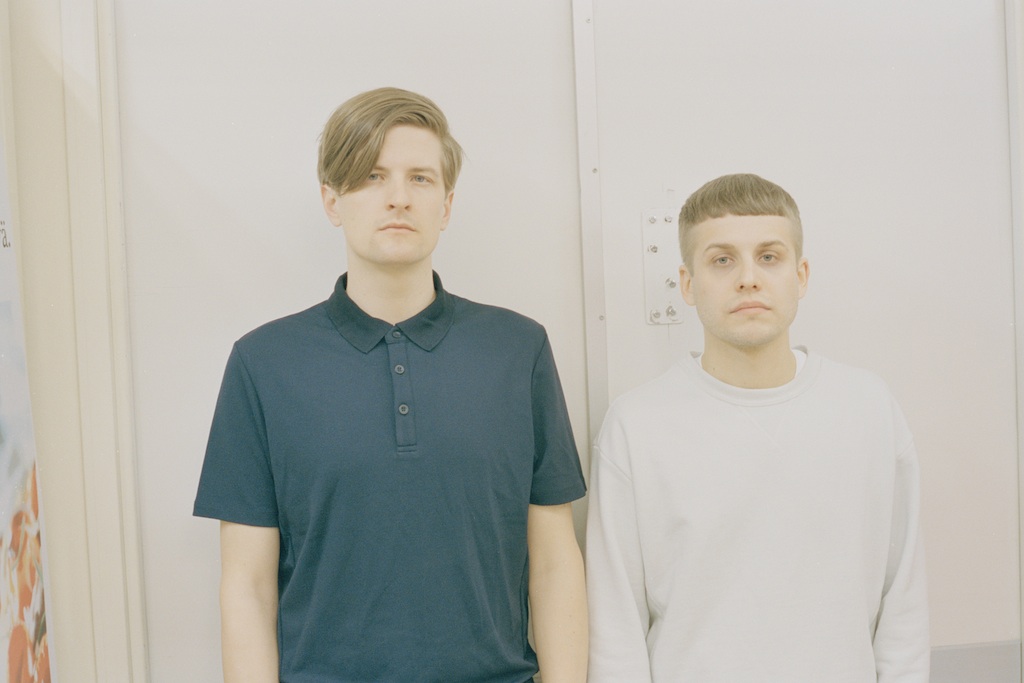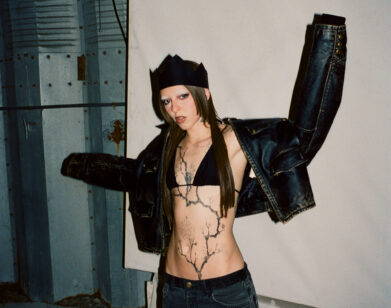Exclusive Song Premiere and Interview: ‘No Thanks,’ Shine 2009

Pop doesn’t have to be reduced to hollow croons banging through the radio. That is a sentiment that Finnish duo, Shine 2009, recognize amidst what might currently be a pop-music renaissance in the world of independent music.
With Shine’s sophomore record, Our Nation (Cascine/Modular Records), due to hit record shops on October 15, we got a chance to talk to lead singer Sami Suova. We are also happy to premiere the pair’s new single below. Titled “No Thanks,” it is a tune that permits both chilling and dancing. Underneath Suova’s nonchalant delivery, Mikko Pykäri’s infectious guitar and keyboard riffs push the song forward into a harmonious groove. Trebled-out baselines, frail guitar tones, and the use of sampling might recall the pop of the’80s, but there are other elements of “No Thanks” that are distinctly of our time. Its arrangement is constantly crawling and tinkering, chiming in and out, and collaging a wide range of influences from R&B to post-punk. While it’s meticulously punchy for the majority of its duration, the song ends on an interesting note. Like the welcomed sleep after a party, “No Thanks” finishes in a distant and dreamy dissolution.
KEBA ROBINSON: How did you start playing music with Mikko?
SAMI SUOVA: I think we’ve known each other for eight years. It was around 2005 when I found his other band, they’re called Regina and they did this electronic-pop type thing back then. It was the only local Finnish band that I was able to listen to. I probably met him at a club and we ended up talking and it was really easy from that point on because we enjoy similar things when it comes to music, aesthetics, and culture in general. Then it was the usual three or four years of basic bar talk about whether we should do something together. I don’t know why we ended up actually giving it a try in 2009. Actually, I think it was my girlfriend or something like that. She sort of changed me in that way. I was more open to experimenting with things. When we started, the biggest challenge we had was that we both wanted to make music with vocals in it, but we felt that neither of us were capable of singing. We asked around for people to sing for us and we made a couple of songs with a singer, but it didn’t work out because we knew what we wanted to do so well. I hadn’t sung before. I had just been singing in the shower when I was alone at home. Then I just thought, let’s give it a try. I guess when we realized that we were actually able to do all the stuff that we want to do—just the two of us—that was the point where we realized that we have a real band here.
ROBINSON: You mentioned that you guys have similar aesthetics. I noticed that the cover of Our Nation seems sort of like an index for the single covers. And then there’s the name Our Nation and the song “Eurozone,” which has lyrics that seem to be sort of anti-capitalist. I was wondering if you guys were into politics at all.
SUOVA: I guess we are. The cover and the songs don’t relate that much. The themes that we have in our songs are really diverse. There might be a couple of songs that move in the world of economics or politics but we also have songs that are just about people’s everyday lives. The cover of the album changes its meaning when you move around the world because in Finland, everyone knows what they stand for. They’re really cliché and worn out Finnish design objects and leisurely symbols. But when you go outside of Finland they kind of get a whole other meaning, they just create this big question mark, which I think is really interesting because you can make your own interpretations. Here in Finland, the message of the cover is to stop being stuck in the past. Outside of Finland, it’s just a beautiful piece of art. You can use your imagination and create a story of how they relate to each other. We’ve kind of approached the album cover the same way as the name of our band because we have the year in our name. It sort of reminds you of something, but it’s not necessarily the same thing for everyone.
ROBINSON: How was making this record different, what was special about it?
SUOVA: I think we took it more seriously. We really concentrated on writing songs. On the first album we were jamming and approaching it in a way where we were doing the production first. The first album was beat oriented. We’d have the beat and then we’d come up with the melodies and the lyrics. With this album, we had all the melodies before we started the production. I guess that was the biggest difference and in that way it became a lot stronger than the first album. We didn’t have that many songs for the first album, but we made sure we had enough good songs to choose from this time. It was a lot easier because we were very confident with the songs before they were even finished.
ROBINSON: Are you excited for your tour with Cut Copy this fall?
SUOVA: Yeah, I think it’s about two weeks in Europe and in Scandinavia and it starts at the end of November and goes on until mid-December. We’ve never done a proper tour before—it’s completely new. Obviously they are a bigger band than we are, so I can expect that the venues will be quite big and that there will be a lot of people there. I’m not scared of it or anything like that. I’m really excited about it because I’m confident that we will sound good. I can’t wait.
ROBINSON: When it comes to bands that only have two people I always wonder if they ever feel pressure to perform more. Have you felt that in the past?
SUOVA: I probably felt that when it was just Mikko and I. Back then, I was concerned that it wouldn’t sound as good as it sounds on the album. But now we have a completely different approach to the live shows. We don’t even try to make them sound the same. We have a live drummer, and Mikko plays the guitar and I sing. It makes us all feel a lot more free because it’s a totally different thing. It’s much more fun that way. So there’s not that much pressure about performing anymore, now there are two other guys to back you up, whereas before it was just computers.
ROBINSON: Have you ever had a massive technical problem on stage?
SUOVA: No, but before we were worried about that all the time. But I feel like if something happens, it’s actually cool. I’m a big fan of all sorts of imperfections. I think it’s cool if something doesn’t work. I think it creates a special bond between you and the audience. I guess it’s different if you’re doing stadium shows or if you’re Jon Bon Jovi. At that point, it’s not your thing, but I never want to be on that level, where you cannot admit your mistakes.
ROBINSON: That’s cool to embrace failure. I guess you kind of need that when you play music.
SUOVA: Yeah, whenever I see a show, I always think that this is going really according to plan, and then I just sort of hope that there would be some sort of glitch so it wouldn’t seem so planned out. It’s life.
ROBINSON: I noticed on Cascine Records’ Facebook page that they have written in their “About” section, “Pop Music Point of View.” I thought that was interesting because they are an indie label, but they have this perspective of supporting popular music, and I was wondering what you thought about that idea.
SUOVA: I think it’s something that changes its meaning all the time. For someone with the style of bands that Cascine represents, I’m pretty sure it’s pop music for everyone. You cannot say it’s not pop music. I guess contemporary pop music has to be more R&B influenced or something, so I guess that’s the difference. I think pop music is a good way to express what you’re doing, because it’s really hard to file your own stuff under anything. You have to make compromises with that. I’m totally fine with being pop music. I cannot come up with any other terms that would suit us better. If someone comes up with one, I’m happy to use that. For me, pop music is such a broad term that you can use it pretty freely. I guess all the people who make music are okay with how they are defined because in the end, when people hear your music, they decide if they like it or if they don’t like it. That’s what matters the most. So I’m fine with pop. I love pop.
ROBINSON: I feel like that’s a new thing—for pop music to be popular within the realm of indie labels.
SUOVA: That’s true. I’ve been thinking the same. I’m really happy about it. People are more excited about the weirder stuff but, at the same time, really easy music is being widely accepted again as well. I think it’s really cool and it’s really good for me because I sort of feel that I’m stuck in pop music. That’s the thing I do the best. It’s also good because I end up discovering new bands that I really like. I would say three years ago there wasn’t that much new music that I was interested in, but it’s totally different now, the past two years have been really exciting when it comes to new music. I discover new stuff all the time.
OUR NATION COMES OUT TUESDAY, OCTOBER 15. FOR MORE INFORMATION, VISIT THE BAND’S FACEBOOK PAGE.






